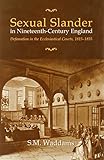Sexual Slander in Nineteenth-Century England : Defamation in The Ecclesiastical Courts, 1815-1855 / S.M. Waddams.
Material type: TextPublisher: Toronto : University of Toronto Press, [2000]Copyright date: ©2000Description: 1 online resource (384 p.)Content type:
TextPublisher: Toronto : University of Toronto Press, [2000]Copyright date: ©2000Description: 1 online resource (384 p.)Content type: - 9780802047502
- 9781442679856
- 346.4203/4
- online - DeGruyter
| Item type | Current library | Call number | URL | Status | Notes | Barcode | |
|---|---|---|---|---|---|---|---|
 eBook
eBook
|
Biblioteca "Angelicum" Pont. Univ. S.Tommaso d'Aquino Nuvola online | online - DeGruyter (Browse shelf(Opens below)) | Online access | Not for loan (Accesso limitato) | Accesso per gli utenti autorizzati / Access for authorized users | (dgr)9781442679856 |
Browsing Biblioteca "Angelicum" Pont. Univ. S.Tommaso d'Aquino shelves, Shelving location: Nuvola online Close shelf browser (Hides shelf browser)

|

|

|

|

|

|

|
||
| online - DeGruyter Settler Feminism and Race Making in Canada / | online - DeGruyter Sex Crimes, Honour, and the Law in Early Modern Spain : Vizcaya, 1528-1735 / | online - DeGruyter Sexual Equality : A Mill-Taylor Reader / | online - DeGruyter Sexual Slander in Nineteenth-Century England : Defamation in The Ecclesiastical Courts, 1815-1855 / | online - DeGruyter Sexuality and Citizenship : Metamorphosis in Elizabethan Erotic Verse / | online - DeGruyter Shakespeare in Canada : A World Elsewhere? / | online - DeGruyter Shakespeare in the Undiscovered Bourn : Les Kurbas, Ukrainian Modernism, and Early Soviet Cultural Politics / |
restricted access online access with authorization star
http://purl.org/coar/access_right/c_16ec
'You are a nasty bloody thundering whore,' one Gloucester woman said to another in 1852. Most lawyers and historians are surprised to learn that until 1855 language of this sort was punishable in the ecclesiastical courts. In a study based on court records and lawyers' correspondence, Stephen Waddams shows how the law worked not only in theory but in practice. He concludes that, though this branch of the law had many deficiencies, it also had certain merits, especially from the point of view of women, who constituted 90 per cent of all complainants. The evidence of the witnesses supplies fascinating details of day-to-day events and of social attitudes from the words of participants, who were mostly of a very modest social status, and not accustomed to recording their views. Their evidence provides a valuable perspective not generally available to historians. The study is of importance to legal historians and to all who have an interest in nineteenth-century England, especially to those concerned with the sexual reputation of women.
Mode of access: Internet via World Wide Web.
In English.
Description based on online resource; title from PDF title page (publisher's Web site, viewed 01. Nov 2023)


